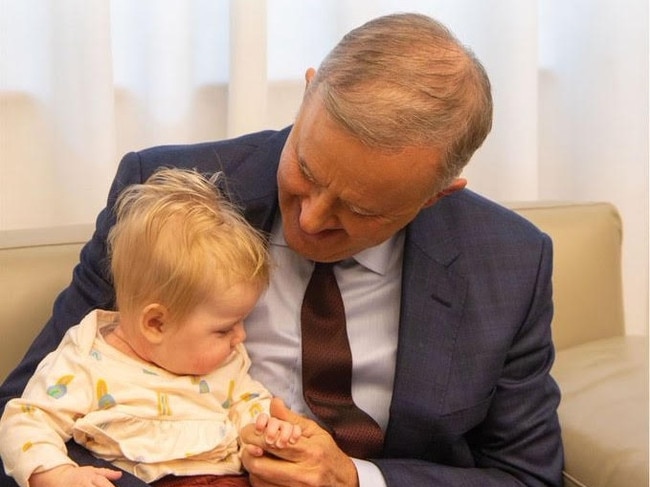Rare disease groups are accusing Labor of breaking its promise on newborn screening
Labor insists it remains on track to deliver on an expanded national newborn screening program.

Labor is denying accusations it has broken an election promise on expanding the nation’s newborn screening program, insisting it is making steady progress on “mapping out a transparent and consistent process” between states to identify and consider conditions for which genetic screening will apply.
Labor promised in April last year to increase the number of screened conditions from around 25 to 80 if it was elected. One of the diseases it promised to include was Pompe disease, with the then opposition-leader Anthony Albanese posing with a baby affected by the rare genetic condition.

Now, the Australian Pompe Foundation, among other groups, is accusing Labor of betraying them, with accusations Labor’s attempts to implement the policy are tied up in unnecessary red tape.
Federal health minister Mark Butler yesterday reiterated Labor’s commitment to the policy, issuing a press release that vowed the government would “continue expanding Australia’s screening towards the 80 benchmark” as part of a transparency process being mapped out with states and territories.
The government is providing the states with $25.3m to support the delivery of screening, as part of $38m funding for the policy.
The Australian Pompe Association is enraged that the government has moved to refer 15 diseases every two years for potential inclusion on the National Newborn Screening Program to the Medical Services Advisory Committee for review and assessment, describing the process as “a massive waste of time, during which more families will watch their babies die”.
“The bereaved families and parents in the rare disease community feel let down by a government that appears happy to use babies for an election photo opportunity but won’t implement their election promises,” said the association’s president Raymond Saich.
The group Better Access Australia is also furious, saying that every day the screening program remains behind global best practice represents five babies missing out on a lifesaving diagnosis. The health groups understood the policy was to be implemented by July 1 this year, but Labor says it never made that commitment.
Better Access chairwoman Felicity McNeill, a former senior federal health department bureaucrat, accused Labor of walking back its commitment to expand the newborn screening program to 80 conditions and “re-badging of the same process we were using before the government was elected”.
Mr Butler responded that Labor had worked as quickly as possible to implement the policy with states and territories.
“Every dollar spent in the health system is precious and must be backed up by robust processes and informed by independent experts,” Mr Butler said.
“Australian families can have confidence the streamlined process for considering conditions for screening will help us expand the program in a much quicker and more transparent way.”




To join the conversation, please log in. Don't have an account? Register
Join the conversation, you are commenting as Logout